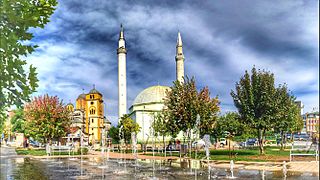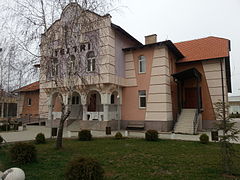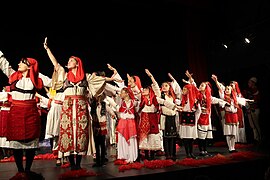
Albania, officially the Republic of Albania, is a country in Southeastern Europe. The country is located in the Balkans on the Adriatic and Ionian Seas within the Mediterranean Sea and shares land borders with Montenegro to the northwest, Kosovo to the northeast, North Macedonia to the east and Greece to the south. Spanning an area of 28,748 km2 (11,100 sq mi), it displays varied range of climatic, geological, hydrological and morphological conditions. Albania boasts a significant diversity with the landscape ranging from the snow-capped mountains in the Albanian Alps and the Korab, Skanderbeg, Pindus and Ceraunian Mountains, to the hot and sunny Albanian Adriatic and Ionian Sea Coasts. Tirana is its capital and largest city in the country, followed by Durrës, Vlorë, and Shkodër.

Kosovo, officially the Republic of Kosovo, is a country in Southeast Europe with partial diplomatic recognition. Kosovo lies landlocked in the centre of the Balkans, bordered by Serbia to the north and east, North Macedonia to the southeast, Albania to the southwest, and Montenegro to the west. Most of central Kosovo is dominated by the vast plains and fields of Metohija and the Kosovo field. The Accursed Mountains and Šar Mountains rise in the southwest and southeast, respectively. Its capital and largest city is Pristina.

Skopje is the capital and largest city of North Macedonia. It is the country's political, cultural, economic, and academic centre. Skopje lies in the Skopje Basin.
This is a list of historical and living Albanians who are famous or notable, sorted by occupation and alphabetically.
The roots of traditional music in Turkey span across centuries to a time when the Seljuk Turks migrated to Anatolia and Persia in the 11th century and contains elements of both Turkic and pre-Turkic influences. Much of its modern popular music can trace its roots to the emergence in the early 1930s drive for Westernization.

Gjakova is the seventh largest city of Kosovo and seat of Gjakova Municipality and Gjakova District. The city has 40,827 inhabitants, while the municipality has 94,556 inhabitants.

Podujevo,Podujeva or Besiana, is a city and municipality in Pristina District in Kosovo. According to the 2011 census, the city of Podujevo has 23,453 inhabitants, while the municipality has 88,499 inhabitants. The population of the city may be higher, as these figures include only the population of the cadastral zone of Podujevo, but not some urban neighborhoods of the city that are outside the cadastral zone.

The University of Pristina is a public university located in Pristina, Kosovo. It is the institution that emerged after the disestablishment of the University of Pristina (1969–99) as a result of the Kosovo War. The inauguration of the university was a historical occurrence not only for the people of Kosovo, but for the whole Albanian nation. On 15 February, the solemn Parliament session took place, which is also proclaimed as The University of Pristina's Day. In the composition of the newly established University of Pristina were faculties with their headquarters in Pristina: the Faculty of Philosophy, Faculty of Law and Economics, Faculty of Engineering and Faculty of Medicine. Now the University of Pristina has 17 faculties, of which 14 are academic faculties and 3 are faculties of applied sciences. Contained within the emblem is a translation of the name into Latin, Universitas Studiorum Prishtiniensis.

Pristina is the capital and largest city of Kosovo. It is the administrative center of the eponymous municipality and district.
Vaçe Zela was an Albanian singer and songwriter. She was a leading figure in the music industry and is considered one of the most influential musicians of the 20th century in Albania, Kosovo and North Macedonia.

Alban Skënderaj is an Albanian singer, songwriter, composer, actor, producer and television personality. Born in Lushnjë and raised in Vlorë, Skënderaj has established himself as a viable artist in Albania and the Albanian-speaking Balkans. Beyond his music career, the singer has been featured as a judge on the Albanian television series The X Factor Albania and The Voice of Albania.

Ferizaj or Uroševac is the sixth largest city in Kosovo by population and seat of Ferizaj Municipality and Ferizaj District.
Classical music in Kosovo refers to the art music cultivated in Kosovo. The roots of classical music in Kosovo are found in the 1940s and include the time period from the times when Kosovo was part of Yugoslavia to this day. It can be said that there is a tradition of classical music in Kosovo, however, compared to other Balkan countries and especially European countries this tradition is younger. Classical music in Kosovo reaches back about 70 years. Even though in a short period of time, this music has evolved, passing through generations of composers and artists. In his book Albanian: Zhvillimi i stileve në veprat e kompozitorëve shqiptarë të Kosovës, Engjëll Berisha comments:
"The diversity of styles in Albanian music [of Kosovo], its national patterns with sound idea-aesthetic foundations are a characteristic of the European musical reality, so many many works are of interest abroad, too, because during this relatively short period Albanian classical music in Kosovo has compensated for the delay in its development."

Elvana Gjata is an Albanian singer, songwriter and entrepreneur. Born and raised in Tirana, she has been referred to as a "Diva of Albanian music". She rose to recognition in Albania and other Albanian-speaking territories in the Balkans following the release of her two studio albums, Mamës (2007) and Afër dhe larg (2011). The singer saw further success through many acclaimed singles, as well as her extended plays 3 (2018) and Çelu (2021), and has achieved multiple number one singles in the Albanian singles chart. Gjata has also received numerous awards and accolades, including two Balkan Music Awards, a Festivali i Këngës Award, four Kënga Magjike Awards and a Top Fest Award.
Events and festivals in Gjakova are highly valued if not great in number. The historical city of Gjakova, Kosovo, especially the Old Bazaar (Çarshia), is the hub of many outdoor and indoor festivals, cultural events and street parades, and is a main attraction for tourists. Many events only take place once, while others are organised regularly on an annual basis by festival societies. Some of the events are organised by the city and others by private companies.

Rugova is a mountain region located to the north-west of the city of Peja, in Kosovo. According to notes of Rugova it has been inhabited since before the 12th century. In 2013, it was designated a national park by the Parliament of Kosovo.
The culture of Prizren consists of a rare blend of the various identities which make up Kosovo. Prizren is a community where different cultures and civilizations have come together, contributing to the city's cultural development over the centuries.

As the capital city of Kosovo, Pristina is the heart of the cultural and artistic development of all Albanians that live in Kosovo. The department of cultural affairs is just one of the segments that arranges the cultural events, which make Pristina one of the cities with the most emphasized cultural and artistic traditions.
Music composition and composers in Pristina refers to music composition and composers who have left their mark in Pristina. The importance of Kosovan Folklore on the different genres, their development and their popularity. As referring to genres as a categorization would not cover all compositions and composers in a fair way, a highlight of every composers work and different genres is provided because of the different genres a composers work has included throughout the years.

Tourism in Pristina attracted 36,186 foreign visitors in 2012, which represents 74.2% of all visitors that visited Kosovo during that year. Foreign visitors mostly come from countries like Albania, Turkey, Germany, United States, Slovenia and North Macedonia, but also from other countries. Some of the most visited places in Pristina are Batlava Lake and Gadime Marble Cave, which are also among the most visited places in Kosovo.






















